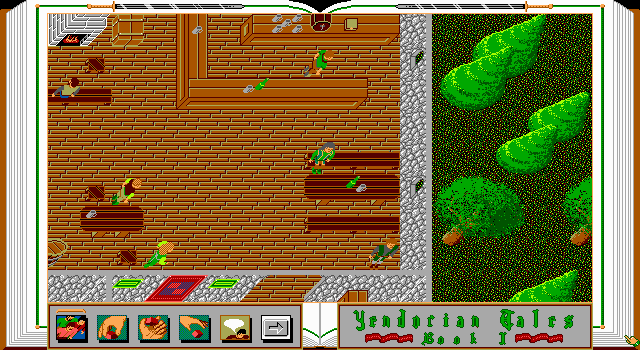
Yendorian Tales Book I is a top-down role-playing game released in 1994. It was published by Spectrum Pacific Publishing and developed by SW Games.
The island nation of Yendor is having problems. Monsters plague the land and various nobles are on the brink of war. This has to be dealt with quickly by a brave adventurer of some sort, and in fact the Society of Wizards is willing to aid one in ridding Yendor's problems. The wizards have their own agenda as well, they need to recovery the stolen orb of the wizard, Zamora.
Yendorian Tales Book I is an overhead view fantasy role-playing game. The player can create and control a party of up to six characters belonging to a variety of classes. Interaction with the NPCs is performed by typing in conversation themes, similarly to Ultima games. Combat takes place on separate screens; the player-controlled party and the opponents move on the battle screen in a turn-based fashion.
This Video Game contains examples of:
- Absurdly Spacious Sewer: Well not exactly a sewer, but one town has a large maze of monster-infested but otherwise empty corridors leading to a magic shop. Just how such a shop can thrive in such a secluded and dangerous place while simultaneously not being looted isn't explained.
- Actually Four Mooks: Outside combat, wandering monsters are depicted as only a single creature (not necessarily the most powerful one).
- Armor and Magic Don't Mix: Averted - spell casters can use the same armor as anyone else. However, wearing armor requires a certain amount of Dexterity, something they often lag behind in compared to the non-spell casters.
- Bandit Mook: Pickpockets, rogues and similar enemies can sometimes steal a bit of your gold instead of making a normal attack.
- Crapsack World: The land of Thaine. In fact, people fled to Yendor just to get away from there.
- Early Game Hell: Some of the random encounters near your starting point will absolutely slaughter you, though on the bright side, they aren't hard to avoid. In addition, leveling up your Rogue can pose a problem because the nearest place to do it is quite some way from your starting point, and the random encounters you can meet on the way can be very tough (the best tactic is to simply run away from these).
- Elemental Crafting: A fairly typical example which also involves Power Equals Rarity - e.g. copper shields are the weakest, silver ones are stronger, gold ones are even more so etc.
- Inexplicable Treasure Chests: All enemies sometimes drop loot when killed, invariably in the form of a treasure chest. Even if they're, say, giant ants or other creatures which have no reason to be carrying one.
- It's All About Me: The individuals who rule Thaine are more concerned for their personal wealth than the welfare of their subjects.
- The Good King: King Yendor, noted to be the only just ruler in the known world.
- Linear Warriors, Quadratic Wizards: Played straight - Wizards and Clerics get all sorts of spells, Rogues and Miners (fighters) are stuck with mundane attacks and throwing potions. Balanced to an extent by the fact that spell points can run out rather quickly, and Nuore (which is required to cast spells) can also be used up quickly if you rely too much on spells. Also, spell casters need to invest in Intelligence or Wisdom, while Rogues and Miners can use these points to beef up their other stats instead, which allows them to use better equipment.
- Party in My Pocket: Outside of combat, only your party's leader is shown on the game screen.
- Random Drop: Monsters sometimes drop chests which you can loot for gold, equipment, tools etc., but are often trapped. Applies even to monsters which would have no use for a chest (e.g. a giant ant).
- RPG Mechanics 'Verse: Some Non Player Characters explicitly refer to game mechanics, saying things like "I gain more experience points each time I kill a monster."
- Sorting Algorithm of Weapon Effectiveness: Played straight except for the shops, which do tend to have stuff you can only use significantly later in the game than when you first see it.
- Thriving Ghost Town: As in most Role Playing Games of its time, towns consist of an inn, a few shops, a guard post and maybe one unique building (jail, casino etc.). Residential housing is almost non-existent.
- Troll Bridge: Literally. You can get ambushed by Trolls as you cross some bridges.
- Unobtainium: Nuore is a more efficient reagent than magic ore. This is used for conducting magic spells, but it is sparsely available and very expensive.
